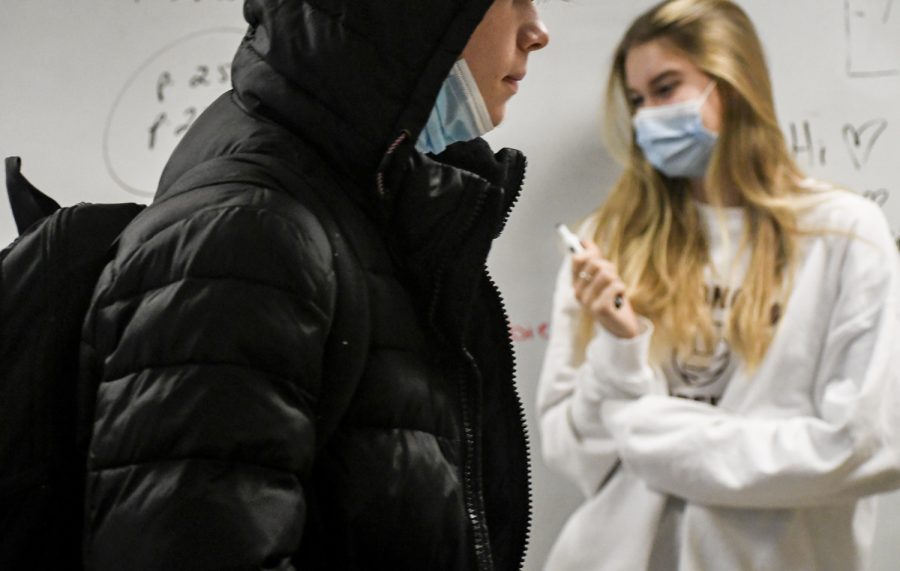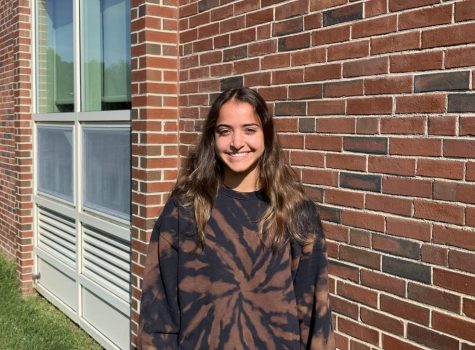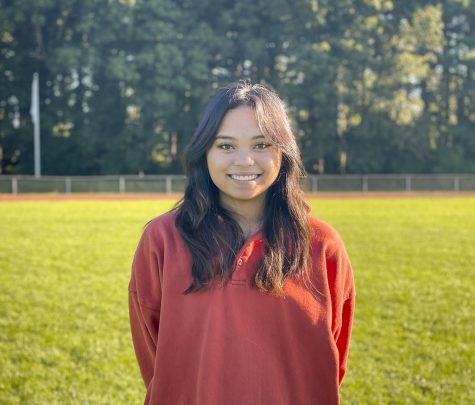Worry rises with increasing Omicron cases
The administration is asking for increased mask compliance due to a rise in COVID cases.
January 13, 2022
The new Omicron COVID variant resulted in a surge of 151 positive cases at Algonquin during winter break, creating worry and uncertainty within the community.
Sixty percent of all positive cases at Algonquin this year occurred from Dec. 20 to Jan. 5, and there were an additional 38 positive cases from Dec. 20 to Dec. 23 that required in-school contact tracing. Around 150 individuals were deemed in-school close contacts, which can be defined as being within three feet of a positive individual for over 15 minutes while masks are worn.
The Omicron strain spreads at a much faster rate than previous variants. Thus, despite Algonquin’s high vaccination rate of 87% among all four grades as of Dec. 15, many vaccinated people are testing positive but with much milder, cold-like symptoms.
District physician Dr. Safdar Medina is a part of the Medical Advisory Team (MAT), which is a group of medical specialists affiliated with the school district. They advise the district on health and safety protocols, particularly with regards to the COVID response.
“I think we are in our Omicron surge, and it may still peak over the next week or so,” Dr. Medina said in an interview on Jan. 2. “We do have to buckle up and keep our guard up for the next couple of weeks.”
District Wellness Coordinator Mary Ellen Duggan, also a part of the MAT, works to track positive cases, notify and inform families, organize test and stay sites and much more in regards to COVID. Duggan explained that some COVID tests are sequenced, meaning they look for a specific variant.
“Two weeks ago, 3% of those [positive] tests were the Omicron variant,” Duggan said in an interview on Dec. 22. “And this week, 73% of those were the Omicron.”
Principal Sean Bevan believes the school is handling the situation as well as they can, but there is still a lot of uncertainty with the virus.
“We already have such a high level of preparedness, and we’re employing such strong protocols already; there’s not that much more we can do,” Bevan said.
Currently, the school is cleaned daily, and there are hand sanitizer dispensers in every classroom.
“Last year, there were a lot more protocols in place,” school nurse Erika Almquist said. “Social distancing was enforced in all places. Even in stores people were required to wear masks, and now you aren’t required to if you’re vaccinated. People are more out and about this year compared to last year.”
Administration has made changes to try to slow the spread of COVID. As of Jan. 3, students are not allowed to do group work that involves them being within three feet of each other, masks must be worn correctly and student spectators are not allowed to attend ARHS athletic events.
“I think that DESE (Department of Elementary and Secondary Education) and CDC (Center for Disease Control and Prevention) really want schools to stay open, and I think that they are going to do everything to make that stay the way it is,” Almquist said.
Additionally, this surge has increased the already high levels of stress and anxiety for some community members. People are worried about testing positive due to close contacts and having to quarantine, which means missing school and sports. The CDC’s article “Coping with Stress” explains that the number of individuals feeling stressed and anxious increased at the start of the pandemic, so this new surge could lead to more mental health issues.
“I do think we are going to see people struggling,” Dr. Medina said. “I think that people should be on the lookout among their friends and family members for changes in behavior. People feeling withdrawn, people feeling on edge and people becoming angrier than they normally are are all signs that they need some emotional support.”
COVID has caused academic stress for many students and teachers. Physics teacher Nathan Largesse has been able to resume his curriculum after a year of hybrid and online school, but he finds there are still setbacks this year.
“Recently, I think the biggest challenge for me and my students has been maintaining continuity despite all the absences and distractions,” Largesse said.
Senior Patrick O’Brien missed a week of school due to a positive COVID test and struggled to keep up with his work while absent.
“The stress of feeling behind was very difficult, especially when your class is learning something new and you have to try and teach yourself and stay on top of your work,” O’Brien said.
According to Dr. Medina, there are many steps individuals can take to keep themselves and others safe. They can get vaccinated, wear a mask and take tests if they have symptoms.
“Please, if you are eligible, get the vaccine,” Dr. Medina said. “If you are 16 and above, get the booster. The best tool we have is vaccination.”











